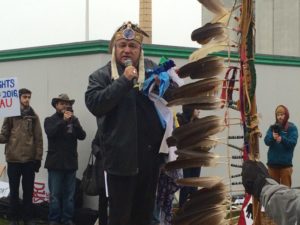First Nations and allies rally at Supreme Court of Canada

OTTAWA, ON (Nov. 30, 2016)–Ontario Regional Chief says today’s hearing to support Chippewas of the Thames’ fight against the approval of Line 9 is an opportunity for the Supreme Court to reaffirm Indigenous Treaty rights and an assurance that Canada must uphold its constitutional duty to consult First Nations.
“As interveners, the Chiefs of Ontario stand in support with both the Chippewas of the Thames and Clyde River,” said Regional Chief Isadore Day. “If a nation to nation relationship truly existed and the duty to consult was fully honoured, strong communities like Chippewas of the Thames and Clyde River wouldn’t have to be here to fight to affirm their inherent rights as partners on this land.”
Chippewas of the Thames, led by Chief Leslie White-Eye has called on all Canadians to join its campaign against energy giant Enbridge’s plan to reverse the flow of oil in the Line 9B pipeline. The community was at the Supreme Court of Canada today for an appeal hearing on the change to the pipeline which travels through Chippewas’ traditional territory, a change which citizens — along with critics and environmentalists — warn could lead to an environmental catastrophe.
“The danger in this case is not only needless and costly litigation, but the erosion of the duty to consult and the promise of rights recognition under section 35 of the Constitution Act,” Regional Chief Day said. “The Chiefs of Ontario have concerns with the consultation process and practical points on the Nation to Nation relationship and commitment between the Federal Government and First Nations across the country. These issues are very complex on one hand, but quite simple from the point of view that First Nations on Turtle Island never relinquished jurisdiction or authority to protect treaty and homelands.”
“We must use these processes carefully and always seek to unearth, enhance and enact our own laws, Conventions, and regulatory systems to protect the land, air and water. This is asserting our inherent jurisdiction.”
In a split 2-1 decision last fall, the Federal Court of Appeal dismissed the Chippewas’ case, in which they argued that the Crown violated its constitutional obligation by not consulting with the community before the National Energy Board approved Enbridge’s request to increase and reverse the flow of crude oil through Line 9.
The Supreme Court also heard similar arguments against the NEB from the Inuit of the Hamlet Clyde River, Nunavut. The community says the NEB also violated its Crown duty by not properly consulting with the Inuit before approving seismic oil testing in waters from where the Inuit hunt and fish for food. They fear that seismic testing could be harmful to marine mammals.


